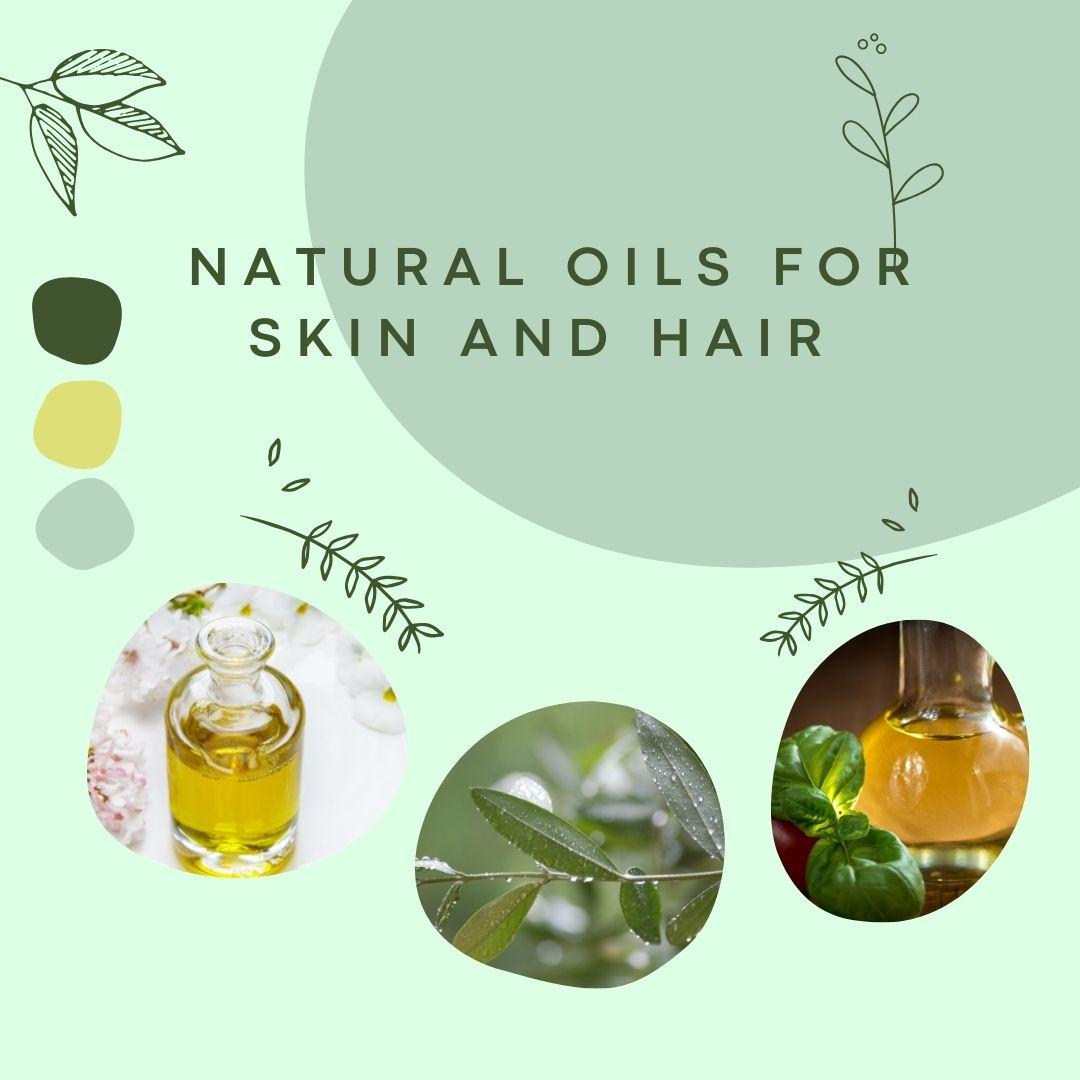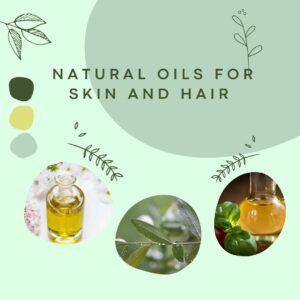
Natural Oils for Skin and Hair
Natural oils have been used for centuries across cultures for their remarkable ability to nourish, protect, and enhance the beauty of skin and hair. These oils, derived from plants, seeds, and fruits, are rich in vitamins, antioxidants, and essential fatty acids that provide deep hydration and repair. Whether you’re looking to combat dryness, promote hair growth, or achieve radiant skin, natural oils can be your go-to solution. This guide explores the best natural oils for skin and hair, their benefits, and how to incorporate them into your daily routine.

What Are Natural Oils?
Natural oils are plant-based extracts obtained through processes like cold pressing or distillation. They can be categorized into:
-
Carrier Oils: These oils (e.g., coconut oil, almond oil) are less concentrated and are often used as a base for essential oils.
-
Essential Oils: Highly concentrated oils (e.g., lavender oil, tea tree oil) extracted from plants known for their therapeutic properties.
Benefits of Natural Oils for Skin
Natural oils offer numerous benefits for skin health:
-
Deep Hydration: Oils like coconut and almond oil penetrate deeply to moisturize dry skin.
-
Anti-Aging Properties: Antioxidants in argan oil and rosehip oil help reduce fine lines and wrinkles.
-
Acne Control: Tea tree oil’s antibacterial properties help combat acne-causing bacteria.
-
Skin Repair: Oils like jojoba and olive oil promote healing of damaged skin.
-
Protection Against Environmental Damage: Vitamin E in many oils acts as a shield against free radicals.
Best Natural Oils for Skin
1. Coconut Oil
-
Benefits: Deeply hydrates dry skin; has antimicrobial properties that prevent infections.
-
Uses: Apply directly to dry areas or use as a makeup remover.
2. Argan Oil
-
Benefits: Rich in Vitamin E and fatty acids; reduces wrinkles and softens skin.
-
Uses: Massage a few drops onto your face before bedtime.
3. Rosehip Oil
-
Benefits: Packed with Vitamin C; brightens skin tone and reduces scars.
-
Uses: Mix with your moisturizer or apply directly to scars.
4. Tea Tree Oil
-
Benefits: Antibacterial properties combat acne; reduces redness and inflammation.
-
Uses: Dilute with a carrier oil before applying to blemishes.
5. Jojoba Oil
-
Benefits: Mimics natural sebum; balances oily skin while hydrating dry patches.
-
Uses: Use as a facial moisturizer or mix with your sunscreen.
Benefits of Natural Oils for Hair
Natural oils can transform your hair care routine by:
-
Promoting Growth: Oils like peppermint and rosemary stimulate the scalp to encourage hair growth.
-
Reducing Breakage: Almond oil strengthens hair strands by providing essential fatty acids.
-
Moisturizing Scalp: Coconut oil deeply nourishes the scalp to prevent dandruff.
-
Enhancing Shine: Argan oil smoothens frizz and adds shine to dull hair.
-
Protecting Against Damage: Antioxidants in natural oils protect hair from environmental stressors.
Best Natural Oils for Hair
1. Coconut Oil
-
Benefits: Penetrates the hair shaft; strengthens strands while moisturizing the scalp.
-
Uses: Apply warm coconut oil to your scalp; leave overnight before washing.
2. Argan Oil
-
Benefits: Rich in antioxidants; tames frizz and adds shine.
-
Uses: Rub a few drops onto damp hair before styling.
3. Almond Oil
-
Benefits: Strengthens hair strands; minimizes breakage.
-
Uses: Massage into your scalp weekly for stronger hair.
4. Peppermint Oil
-
Benefits: Stimulates blood circulation in the scalp; promotes growth.
-
Uses: Dilute with a carrier oil before massaging into the scalp.
5. Tea Tree Oil
-
Benefits: Antimicrobial properties keep the scalp clean; prevents dandruff.
-
Uses: Mix with shampoo or dilute with coconut oil for scalp application.
How to Use Natural Oils Effectively
-
For Skin:
-
Apply carrier oils directly to clean skin as a moisturizer.
-
Dilute essential oils with carrier oils before use to avoid irritation.
-
Use oils like rosehip or argan at night for enhanced repair during sleep.
-
-
For Hair:
-
Warm carrier oils (e.g., coconut or almond) slightly before applying to the scalp for better absorption.
-
Combine essential oils like rosemary or peppermint with carrier oils for targeted treatments.
-
Use lightweight oils like argan on damp hair as a leave-in conditioner.
-
DIY Recipes Using Natural Oils
1. Hydrating Face Serum
Ingredients:
-
1 tablespoon jojoba oil
-
3 drops rosehip oil
-
2 drops lavender essential oil
Instructions:
Mix all ingredients in a small bottle and apply nightly after cleansing.
2. Scalp Nourishing Mask
Ingredients:
-
2 tablespoons coconut oil
-
5 drops rosemary essential oil
-
3 drops tea tree oil
Instructions:
Massage into the scalp; leave on for 30 minutes before washing.
3. Anti-Frizz Hair Spray
Ingredients:
-
1 cup distilled water
-
1 teaspoon argan oil
-
5 drops peppermint essential oil
Instructions:
Combine ingredients in a spray bottle; mist onto damp hair before styling.
Tips for Choosing High-Quality Natural Oils
-
Ensure the label specifies “100% pure” or “cold pressed.”
-
Opt for organic products free from synthetic additives or preservatives.
-
Choose dark glass bottles to preserve freshness by blocking light exposure.
-
Check expiration dates since natural oils can degrade over time.
Precautions When Using Natural Oils
-
Perform a patch test before using new oils to check for allergic reactions.
-
Avoid applying undiluted essential oils directly onto the skin or scalp as they may cause irritation.
-
Store oils properly in cool, dark places to maintain their potency.
Frequently Asked Questions
What are natural oils?
Natural oils are plant-based extracts obtained from seeds, nuts, fruits, or flowers through processes like cold pressing or distillation. They are rich in nutrients and can be used for various purposes, including skincare, haircare, and aromatherapy.
Why should I use natural oils for my skin and hair?
Natural oils offer numerous benefits:
-
Nourishment: They provide essential vitamins, antioxidants, and fatty acids that hydrate and nourish the skin and hair.
-
Chemical-Free: Natural oils are free from synthetic additives and harsh chemicals, making them safer for sensitive skin.
-
Versatility: They can be used in various applications, such as moisturizers, serums, hair treatments, and massage oils.
-
Therapeutic Properties: Many natural oils have anti-inflammatory, antibacterial, or antifungal properties that promote overall health.
Which natural oils are best for skin?
Some of the best natural oils for skin include:
-
Coconut Oil: Deeply hydrates and has antimicrobial properties.
-
Argan Oil: Rich in Vitamin E; reduces wrinkles and softens skin.
-
Rosehip Oil: Brightens skin tone and reduces scars.
-
Tea Tree Oil: Antibacterial properties help combat acne.
-
Jojoba Oil: Balances oily skin while hydrating dry patches.
Which natural oils are best for hair?
Some of the best natural oils for hair include:
-
Coconut Oil: Strengthens hair strands and deeply nourishes the scalp.
-
Argan Oil: Tames frizz and adds shine to dull hair.
-
Almond Oil: Strengthens hair and minimizes breakage.
-
Peppermint Oil: Stimulates blood circulation in the scalp to promote growth.
-
Tea Tree Oil: Keeps the scalp clean and prevents dandruff.
How do I use natural oils on my skin?
You can use natural oils on your skin in several ways:
-
As a Moisturizer: Apply directly to clean skin after cleansing.
-
In a Serum: Mix with other beneficial ingredients for targeted treatments.
-
As a Makeup Remover: Use oil to dissolve makeup before cleansing.
How do I use natural oils on my hair?
To use natural oils on your hair:
-
As a Pre-Shampoo Treatment: Apply oil to your scalp and hair, leave it on for 30 minutes or overnight, then wash out with shampoo.
-
As a Leave-In Conditioner: Rub a few drops of oil between your palms and apply to damp or dry hair to tame frizz and add shine.
-
In Scalp Massages: Use oil to massage your scalp to promote circulation and nourish the roots.
Are there any precautions when using natural oils?
Yes, here are some precautions:
-
Patch Test: Perform a patch test before using new oils to check for allergic reactions.
-
Dilution of Essential Oils: Avoid applying undiluted essential oils directly onto the skin or scalp as they may cause irritation; always dilute with a carrier oil.
-
Storage: Store oils properly in cool, dark places to maintain their potency.
Can I mix different natural oils?
Yes, you can mix different natural oils based on your needs. For example, you can combine carrier oils like jojoba or almond oil with essential oils like lavender or tea tree oil for enhanced benefits.
How should I store natural oils?
To maintain their quality:
-
Store them in a cool, dark place away from direct sunlight.
-
Use dark glass bottles to prevent oxidation.
-
Ensure the lid is tightly sealed after each use.
What is the shelf life of natural oils?
The shelf life of natural oils varies depending on the type of oil. Generally, they should be used within 6 to 12 months after opening for optimal freshness. Always check for off smells or flavors before use.
Are all natural oils organic?
Not all natural oils are organic. If you prefer organic options, look for labels indicating that the oil is certified organic to ensure it was produced without synthetic pesticides or fertilizers.
Conclusion: Embracing Natural Oils for Skin and Hair Care
Natural oils are nature’s gift, offering unparalleled benefits for both your skin and hair health without relying on synthetic chemicals or harsh treatments. From deeply hydrating dry skin with coconut oil to promoting hair growth with rosemary essential oil, these versatile products cater to diverse beauty needs while aligning with sustainable practices.
By incorporating natural oils into your daily routine:
-
You can achieve radiant skin free from dryness or irritation.
-
You can enjoy strong, shiny locks that resist damage and breakage.
-
You support eco-friendly beauty solutions that prioritize purity over additives.
Switching to natural oils is not just an investment in beauty—it’s an investment in holistic wellness!
